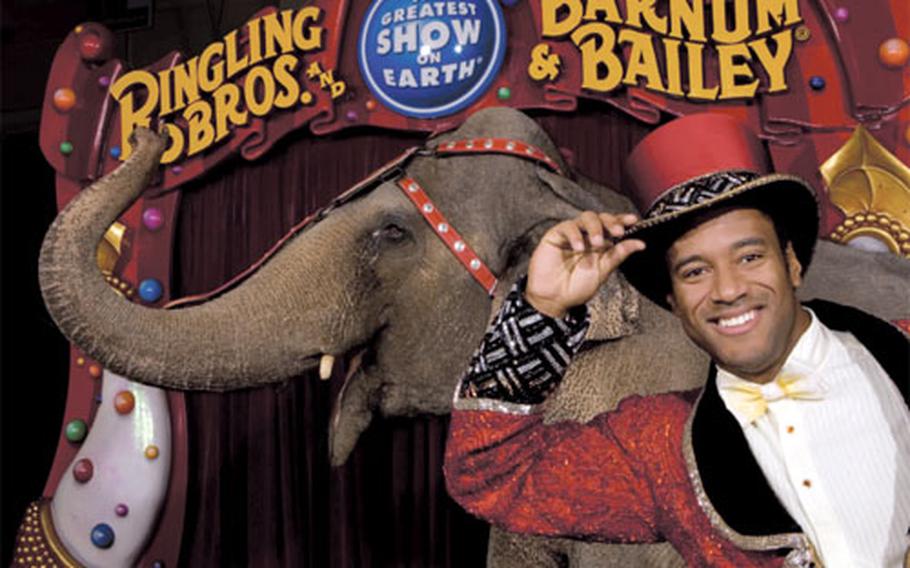
Tyron McFarlan Jr. gave up his Army greens for a ringmaster’s top hot and tails. He has been with Ringling Bros. and Barnum & Bailey Circus for the past two years. (Courtest of Ringling Bros.)
When Tyron McFarlan Jr. left the Army, his life became a three-ring circus. Literally.
After 13 years in the Army National Guard, McFarlan, then a captain, decided he wanted to do something completely different. He wanted to sing, perform and dance.
So he did. He left behind his job as a light wheel mechanic and slowly, but surely, began building a résumé as a stage performer in local musical theaters close to his home in South Carolina and across the country. He earned spots in shows such as “Ragtime,” “Smokey Joe’s Cafe” and “Jesus Christ Superstar.”
Then, he found the job advertisement of a lifetime — Ringling Bros. and Barnum & Bailey Circus needed a ringmaster.
McFarlan nailed the audition, was offered the job, and promptly ran away with the circus.
“What I love the most is the jaw-dropping faces I see,” McFarlan says during a phone interview between shows. “I look at the audience and see people grabbing their faces. It’s fantastic to look at the audience and see their reaction.”
Those who knew the top-hatted ringmaster when he wore a greener uniform might say he was a natural for the job. McFarlan, 35, says that in the military, he was always finding a way to perform, whether in worship services on base or calling cadence on runs.
Now he drills the clowns much like he would a group of soldiers.
During the performance, McFarlan marches his troupe of florescent-haired, oversized-shoe-wearing recruits through an exercise regime of sorts, all the while assuring the audience that, as a former soldier, he knows exactly what he’s doing.
“I hope I make it fun; it really is a very taxing job,” says McFarlan, who’s been ringmaster for two years. “Most performers are on for 10 minutes and done for much of the rest of show. I’m the only performer on the floor the entire show.”
As the show’s 34th ringmaster, McFarlan is also the face of the circus’ red tour, one of three Ringling Bros. troupes that crisscross the United States.
McFarlan credits his military career and a few tips from his father, who retired as a chief warrant officer in the Army, with giving him the discipline and training to become a ringmaster.
“Being conscious of time and being at a particular point at a particular time on the floor, and considering the fact that I have 9,000-pound elephants walking around me, a lot of the discipline I learned in the military helped me with being a ringmaster,” McFarlan says.
His military background is an instant connection between McFarlan and many audience members he meets.
“That’s always the first question: ‘How did you go from captain to ringmaster?’ But I tell them it wasn’t a lateral transfer,” he says. “A lot of people are really proud of my having been in military. People really honor that.”